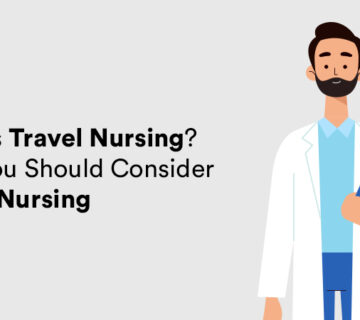Before knowing how to become a Registered Nurse firstly we should know precisely what Registered Nurses are and what are its types.
Registered Nurses
Registered nurses (RNs) are licensed healthcare professionals who provide nursing care to patients in various medical settings, from hospitals and clinics to home health care. They work under the supervision of doctors and other healthcare professionals to help patients recover from illness or injury, manage chronic conditions, and promote health and wellness. RNs typically have an associate’s degree in nursing (ADN), although a bachelor’s degree is becoming increasingly common.
Types of Registered Nurses
1. Addiction Nurse
Addiction nurses are registered nurses that specialize in the treatment of addiction. They work with patients addicted to drugs or alcohol and help them overcome their addiction. Addiction nurses can provide patients with both counseling and medication therapy, and they can also help them to find support groups and other resources to help them stay sober.
2. Cardiovascular Nurse
A cardiovascular nurse is a registered nurse who specializes in the care of patients with heart disease. They may work in a hospital setting, or in a clinic or office setting. Cardiovascular nurses are experts in the diagnosis and treatment of heart conditions, and they can provide patients with the education and support needed to manage their condition. They may also be involved in research related to heart disease.
3. Critical Care Nurse / ICU Nurse
Critical care nurses are in charge of caring for patients who are critically ill and require around-the-clock monitoring. They work in the intensive care unit (ICU) of hospitals, where they provide care to patients with life-threatening conditions such as heart attacks, strokes, and sepsis.
4. Gastroenterology Nurse
A gastroenterology nurse is a registered nurse who specializes in the care of patients who have problems with their digestive system. This can include anything from stomach pain to intestinal bleeding. These nurses are experts in diagnosing and treating conditions that affect the gastrointestinal tract. They work in a variety of settings, including hospitals, clinics, and private practice.
5. Medical-Surgical Nurse
Medical-Surgical Nurses are registered nurses who care for patients in a variety of settings, including hospitals, clinics, and long-term care facilities. They are responsible for assessing patients’ needs and providing treatment and support. Medical-Surgical Nurses must be able to work independently and make critical decisions under pressure. They must also be able to effectively communicate with patients and their families.
6. Neonatal Nurse
Registered nurses who specialize in caring for newborns are called neonatal nurses. They work in hospitals NICUs (neonatal intensive care units) and in homes with newborns who have health problems. They work long hours, often on call, and must be able to deal with the stress of caring for critically ill babies. Neonatal nurses are experts in caring for premature and low birth weight infants, as well as those who are born with congenital defects.
7. Occupational Health Nurse
Occupational health nurses provide care to employees who are injured or become ill as a result of their work. They work with companies to create and enforce policies and procedures that promote employee health and safety. Registered nurses can become certified in occupational health through the American Board of Occupational Health Nurses.
8. Public Health Nurse
Public health nurses are registered nurses who work in the public health sector. They may work in a variety of settings, including clinics, hospitals, and schools. Their primary focus is on promoting and protecting the health of the population. They may provide preventive care, treat illness and injury, and provide education on healthy living habits.
In conclusion, registered nurses come from a variety of backgrounds and can specialize in many different areas. No matter what type of nurse you are, though, you are always in high demand due to the critical role you play in the healthcare system. So if you are thinking about becoming a registered nurse, now is a great time to do it!
How to become a Registered Nurse?
Becoming a registered nurse is a long and challenging process , but it can be very rewarding. There are many different paths to become a registered nurse, we will provide you with all the information in this blog including what education is needed to become a registered nurse, how to get your nursing license and where you can take your required advance training.
There is no fastest way to become a Registered nurse. One has to go through a series of steps either its an international student willing to do nursing in the USA or a domestic student of the United States of America willing to become a nurse after high school.
Broadly there are four key steps involved in becoming a Registered Nurse in the USA.
Earning a Degree
In order to become a registered nurse in the United States, you need to earn a degree from an accredited nursing program. How long it takes to become a registered nurse varies from state as, One can pursue a diploma, an associate degree in nursing, or a Bachelor’s Degree in Nursing (BSN). Educational requirements varies from state to state as some states allow Registered nurses to practice with a simple associate degree of nursing while some states require RNs to hold a Bachelor’s Degree in Nursing. Degree holds more credibility and with the advancement in the health sector, Degree can be made a compulsion in all the states hence it is advisable to hold a Bachelor’s Degree if someone wish to become a Registered Nurse.
If you want to earn a degree in BSN there are many different options available as if you are a high school graduate, a traditional four-year BSN is a good fit for you or if you already have your associate’s degree in nursing, you can opt for RN – BS Completion Program, which takes around 12-14 months and if you already have a bachelor’s degree in non-nursing fields, there are other accelerated nursing programs that can be completed within a period of 16-24 months.
Passing the NCLEX Exam
Registered nurses must pass the NCLEX exam in order to become licensed nurses. The NCLEX is a comprehensive test that covers all areas of nursing. It is designed to ensure that nurses are competent and safe practitioners. The NCLEX is not easy, but it can be successfully passed with preparation and practice.
There are many ways to prepare for the NCLEX exam. Some people choose to attend a prep course, while others study on their own. No matter how you choose to prepare, it is important to make sure that you cover all the material. The NCLEX tests your knowledge of nursing theory and practice, so you need to be familiar with both.
Practice questions are also an important part of preparing for the NCLEX exam. You can find practice questions online or in study guides.
Obtaining a State Licensure
Obtaining a state licensure as a registered nurse can be a daunting process. It is important to ensure that you are familiar with the requirements of the state in which you wish to practice. The National Council of State Boards of Nursing (NCSBN) provides an overview of the requirements for each state. In addition, the NCSBN offers a database of contact information for each board of nursing in the United States.
The requirements for licensure vary by state, but generally include graduation from an accredited nursing program and passing the National Council Licensure Examination (NCLEX). Some states also require additional certification in specific areas, such as neonatal intensive care or pediatric nursing.
It is important to note that licensure is not always required to work as a registered nurse.
Getting Advance Training (Optional)
The nursing field is constantly evolving, and in order to keep up with the latest changes, nurses need to receive advance training. Registered nurses can receive this training through various programs offered by colleges and universities. Many of these programs offer online courses, which allow nurses to continue working while they are learning. Advance training can help nurses stay current on the latest trends and techniques in the nursing field. Additionally, it can help them move up the career ladder and obtain promotions.
Some of the courses are Master’s Degree in Nursing (MSN) and Doctorate of Nursing Practice (DNP). Each of these can substantially boost your pay.


